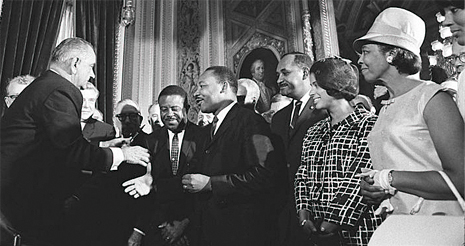By Mark Curriden
Texas Attorney General Greg Abbott and state Republican leaders blasted the federal Voting Rights Act of 1965 as outdated and unnecessary. They have asked two separate federal courts to declare the law an unconstitutional encroachment on the sovereignty of the state.
Instead, they may have just assured its legal survival.
Election and constitutional law experts say that the Voting Rights Act rose from near death – or at least irrelevance – this past week when two different federal courts in different separate cases ruled that Texas Republican leaders significantly overreached in 2011 when they implemented new congressional and state house districts and later imposed strict new voter identification requirements.
While both court decisions were significant, legal analysts say that the three judge panel’s ruling last Tuesday that state legislators committed intentional racial discrimination when they drew new voting districts last year could be a fatal blow to Attorney General Abbott’s mission to kill the Voting Rights Act, which was enacted to protect minority voters from discriminatory practices.

The court decision, written by an appointee of President George W. Bush, cites specific emails and pinpoints minute factual details that the judges say prove that Texas Republican leaders took actions that they knew undermined the voting power of blacks and Hispanics.
That ruling, according to more than a dozen independent legal experts (nine academics and four federal judges with no connection to the Texas cases) interviewed by The Texas Lawbook, is likely to encourage judges in other pending Voting Rights Act cases to be more aggressive in scrutinizing the motives and actions of state officials in election law-related matters and it will make it significantly more difficult for the Supreme Court of the United States to toss aside the civil rights law as no longer germane.
“There have been growing arguments during the past couple years that the Voting Rights Act is obsolete and should be struck down,” says University of Michigan law professor Ellen Katz, a nationally recognized election law expert. “But Rick Perry and the State of Texas, through their over-reach in these cases, may have just saved the law from extinction.”
“It is amazing that Texas officials intended to kill the Voting Rights Act, but because of the evidence of intentional discrimination, they may have just resurrected it,” she says.
Abbott filed legal notice Friday that he intends to appeal the redistricting case to the Supreme Court of the United States.
The federal court redistricting decision this week has no impact on the November elections because a separate federal court in San Antonio has implemented a different voting map that it ruled meets the basic tenets of the Voting Rights Act.
Legal experts say that the undisputed evidence and subsequent court finding of intentional discrimination make it much more difficult for Texas officials to effectively argue to the justices that the Voting Rights Act should be struck down.
“I see no indication that the Supreme Court is itching to overturn the Voting Rights Act – especially not now,” says John Attanasio, dean and constitutional law scholar at SMU Dedman School of Law.

At the heart of the legal debate is a provision in the Voting Rights Act known as Section 5, which requires Texas and eight other states with a history of discriminatory conduct toward minority citizens to get approval from either the U.S. Justice Department or the federal courts before making any changes to its election process.
When Congress passed the Voting Rights Act 47 years ago, it intended that Section 5 be enforced for only five years, as Congress hoped that the nine states would cease their discriminatory practices by then. Congress has since extended the provision multiple times – most recently in 2006 when a Republican-controlled House and Senate renewed it through 2031.
Most of the nine Section 5 states have enacted redistricting and even passed voter ID laws during the past two years that were more sensitive to minority voting considerations. Those laws were approved by DOJ and the federal courts.
Not so in Texas.
“The Texas Legislature in 2011 went on a power grab in order to get the maximum political benefit for the political party in charge,” says University of California-Irvine law professor Rick Hasen, who is considered one of the nation’s leading experts on election law disputes.
“The direct evidence that Texas officials acted with a racially discriminatory purpose in redistricting overshadows all other legal arguments by the state,” says Hasen.
Hasen, Katz and other legal experts point out that the voter ID and redistricting cases are distinctly different issues with unique sets of facts and are being handled by two separate courts.
The redistricting case involves the political maps as originally drawn by the Texas Legislature last year after the state added more than four million new residents between 2000 and 2010. As a result, Texas was awarded four new Congressional seats, which required redistricting.
While the U.S. Census Bureau reported that 89 percent of Texas’ new residents are Latino or African-American, state legislators created two new Hispanic congressional seats but gerrymandered the map so that two districts previously held by Hispanics would go to whites, according to the court ruling.
Not only did minority residents not gain any additional congressional seats, the legislature stripped the districts they do hold of economic engines, such as airports and sports arenas. The legislature took no such action against Republicans.
“The federal court says that the Texas Legislature went out of its way to not create any new districts where minorities would be elected,” says Dallas election lawyer Michael Li, who has been following the case. “It was the equivalent of creating four new Anglo congressional seats and, in Texas, that means four new Republican seats.”
Opponents of Section 5, including the Texas Attorney General’s office, have argued that it is unfair to require the state to prove that its redistricting or voter ID restrictions are not racially discriminatory. Instead, states should only be second-guessed if they pass laws that intentionally discriminate.
The problem for Texas officials going forward, according to legal experts, is that the three-judge panel, which included two appointees of former President George W. Bush, turned the case upside down by issuing a 154-page opinion that focuses on evidence of intentional discrimination by the legislators instead of a debate about the legitimacy of the Voting Rights Act.
“The State of Texas did itself no favors in these two cases,” says University of Texas law professor Joseph Fishkin, an election law expert who has followed the two cases.
“Attorney General Abbott set up these cases to appeal to the Supreme Court, where the justices are more conservative and are not bound by prior precedent,” says Fishkin. “But the trial court’s findings of fact in these cases are supposed to get great deference.”
Li, a former corporate lawyer at Baker Botts in Dallas, agrees.
“The court’s finding of intentional discrimination means that the Texas Attorney General’s appeal, which was already a long shot, is now much tougher,” he says. “It seriously undermines Abbotts overall argument that the law is unnecessary or intrusive.”
The four federal judges interviewed by The Texas Lawbook, none of whom have a Voting Rights case on their docket, said the decision in the redistricting case is getting wide readership among their colleagues on the bench around the country.
“I guarantee you that this decision will be cited in every Voting Rights case going forward,” said one judge, who asked not to be identified. “It is a powerful decision that says, unfortunately, racial discrimination is alive in our country.”
There’s more bad news for Texas officials, according to legal analysts. The Voting Rights Act has a “fee shifting” rule for legal fees, which is very similar to the strong “loser pays” legislation that Gov. Perry and Texas Republicans unsuccessfully pushed last year.
That means that Texas taxpayers will be required to pay millions of dollars in legal fees of the minority groups involved in the redistricting and the voter ID cases if the state ends up losing these lawsuits.
